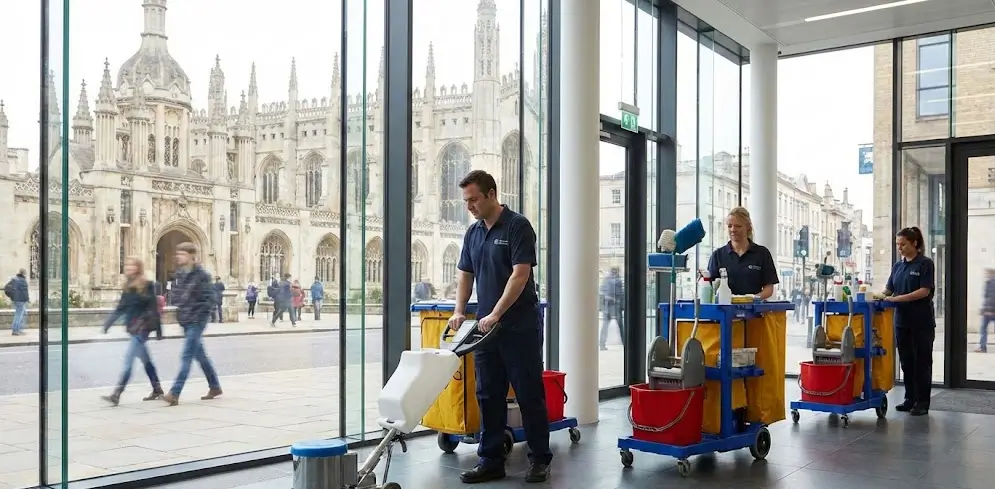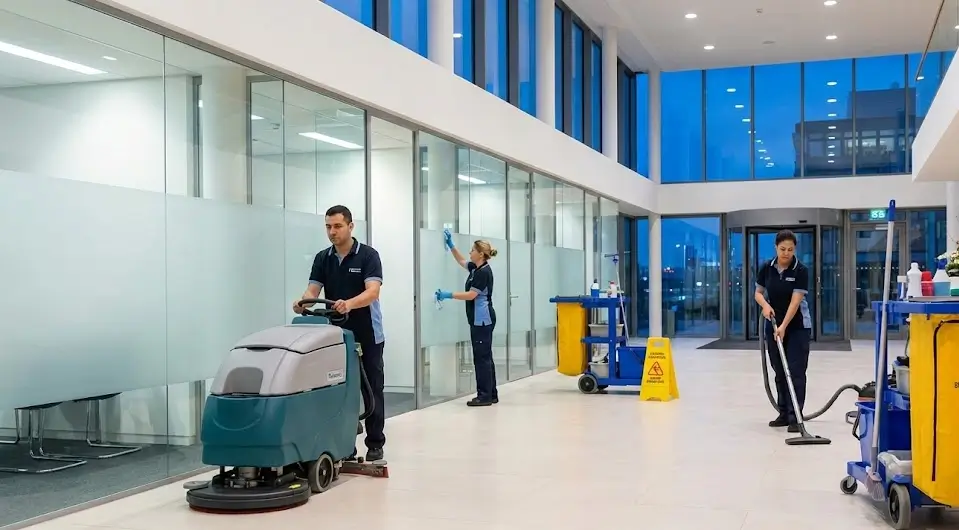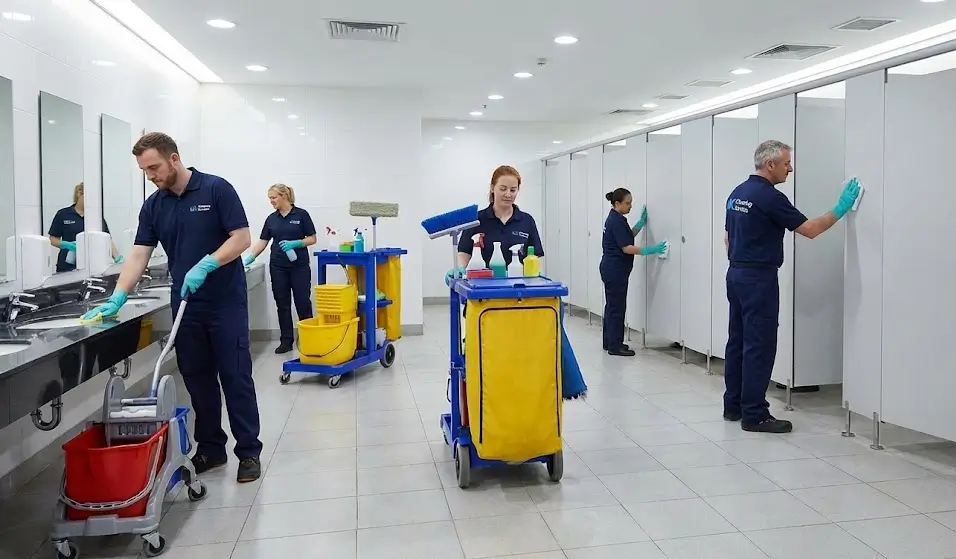TL;DR: Effective large-scale event cleaning relies on meticulous pre-planning, continuous on-site management, and a thorough post-event deep clean to ensure attendee safety, enhance reputation, and meet sustainability goals.
Key Takeaways:
- Proactive Planning is Paramount: Successful event cleaning starts long before gates open, with detailed site assessments, waste management plans, and crew training.
- Continuous On-Site Management is Crucial: During the event, constant waste collection, vigilant restroom maintenance, and rapid response to spills are essential.
- Thorough Post-Event Restoration: A systematic deep clean and optimized waste sorting are critical to return the venue to its original state and maximise recycling.
- Strategic Partnerships are Key: Engaging experienced cleaning professionals with local knowledge and a commitment to sustainability ensures a pristine and successful event.
The vibrant festival and concert scene is a testament to our love for music, culture, and shared experiences. From dusty, sun-baked plains to bustling urban landscapes hosting major concerts, these large-scale events bring together thousands, sometimes hundreds of thousands, of people for unforgettable moments. Yet, behind the bright lights and booming sound systems lies an often-overlooked, but absolutely critical, logistical challenge: effective cleaning and waste management.
The impact of cleanliness on an event’s success cannot be overstated. It directly influences attendee experience, public health and safety, the event’s reputation, and its environmental footprint. A well-managed cleaning operation ensures a positive, safe, and enjoyable environment for everyone, reflecting positively on organisers and leaving a clean slate for future events.
Why Impeccable Event Cleaning is Non-Negotiable
The success of any large-scale event, particularly a festival or concert, extends far beyond the ticket sales and the quality of the acts. It hinges significantly on the environment created for attendees. A pristine site isn’t just about aesthetics; it’s fundamental to health, safety, and sustained reputation.
Health and Safety First: In environments where thousands gather, the risk of germ spread is magnified. Toilets, food vendors, and high-touch surfaces can quickly become breeding grounds for bacteria and viruses. Meticulous cleaning minimises this risk, protecting attendees and staff alike.
Furthermore, spills, dropped food, and general litter pose significant slip, trip, and fall hazards, especially in crowded spaces. Proactive cleaning prevents accidents, ensuring your event complies with stringent health and safety regulations, including local council guidelines designed to protect public welfare.
Protecting Your Event’s Reputation and Brand: An event’s cleanliness leaves a profound, lasting impression. Attendees remember not just the music or the atmosphere, but also the state of the facilities. A clean, well-maintained site speaks volumes about the organisers’ professionalism and care, much like a meticulous cleaning checklist ensures a positive experience for guests in any hospitality setting.
Conversely, a messy, overflowing, or unsanitary environment can quickly erode goodwill, lead to negative social media buzz, deter future attendees, and even impact sponsorship opportunities. A clean event encourages attendees to act responsibly and respect the space.
Environmental Stewardship: With a strong community focus on conservation, placing a high value on sustainability is crucial. Large events generate colossal amounts of waste, and the imperative to minimise landfill waste and maximise recycling is paramount. Effective waste management for events is not just a trend; it’s a legal and ethical responsibility.
Neglecting this can lead to environmental damage, damage to the event’s public image, and potential fines. Responsible cleaning practices protect local ecosystems, especially for outdoor venues often situated in sensitive natural areas.
Enhancing the Attendee Experience: Ultimately, a clean and comfortable environment significantly enhances the overall attendee experience. Clean restrooms, clear pathways, and tidy food areas contribute to a sense of well-being and allow patrons to focus on enjoying the event.
High attendee satisfaction often translates into repeat visits, positive word-of-mouth, and a stronger, more beloved event brand.
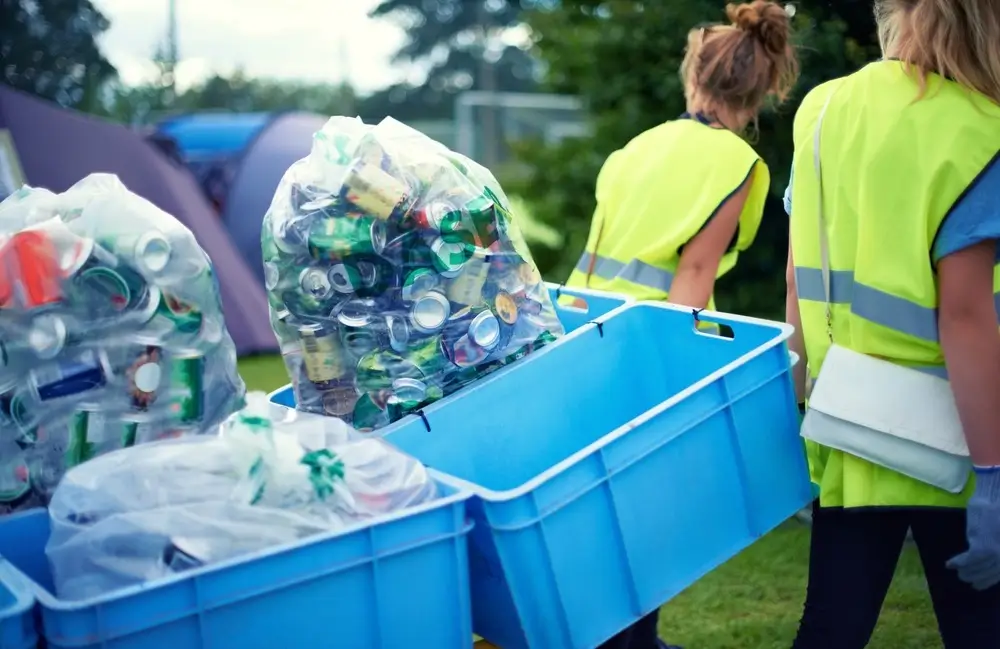
The Three Phases of Strategic Event Cleaning
Effective event cleaning is not a spontaneous act; it’s a meticulously planned operation divided into three critical phases: pre-event preparation, during-event execution, and post-event restoration.
A. Pre-Event Planning: The Blueprint for Cleanliness
The groundwork laid before the first ticket is scanned is crucial. This phase is about developing a robust blueprint for cleanliness.
- Site Assessment and Risk Analysis: This involves a thorough reconnaissance of the venue. Understanding the layout, identifying high-traffic zones (entrances, stages, food courts, bars, restrooms), and potential bottlenecks is key. Event organisers must pinpoint potential waste generation points, from food stalls to merchandise stands, to strategise bin placement. Crucially, assessing access for cleaning crews and waste removal vehicles ensures efficiency once the event is underway.
- Developing a Comprehensive Waste Management Plan: This is the backbone of any large-scale event cleaning strategy. It involves accurately estimating waste volume and types—general waste, recycling (plastics, cans, paper), and organics (food scraps). Strategic placement of bins is vital: they must be clearly labelled, easily accessible to attendees, and in sufficient numbers to prevent overflow. Special waste considerations, such as medical waste or hazardous materials, must also be meticulously planned. This is where how to plan cleaning for festivals and concerts truly begins.
- Equipment and Supplies Logistics: Identifying the necessary machinery, from large sweepers for wide-open spaces to pressure washers for hard surfaces, is essential. Stocking up on all essential cleaning supplies, with a strong preference for eco-friendly and biodegradable options, is a must. Ensuring adequate water and power access for cleaning operations across the site is a fundamental logistical detail often overlooked.
- Team Briefing and Training: A well-drilled cleaning crew is your greatest asset. Assigning clear roles and responsibilities to each team member is vital. Comprehensive training on safety protocols, detailed waste segregation procedures, and rapid response mechanisms for spills or incidents ensures a smooth operation. Establishing clear communication channels for real-time issues allows for swift problem-solving.
B. During-Event Operations: The Proactive Approach
Once the gates open, the focus shifts to continuous, proactive management. This is where the plan comes to life.
- Continuous Waste Collection: Regular emptying of bins is paramount to prevent unsightly overflows, which can quickly turn a lively area into an unpleasant one. Dedicated teams should be assigned for constant litter picking in high-visibility areas, ensuring the event maintains a clean appearance throughout. Rapid response to spills, broken glass, or unforeseen incidents is critical for safety and aesthetic appeal.
- Restroom and Amenity Management: Restrooms are often a key indicator of an event’s overall cleanliness. Frequent checks and thorough cleaning of toilets and handwashing stations are non-negotiable. Replenishing supplies like toilet paper, soap, and hand sanitiser continuously ensures attendee comfort and hygiene. Addressing blockages and maintenance issues promptly prevents a small problem from escalating.
- High-Traffic Zone Focus: Areas around stages, food courts, bar areas, and main entrances experience the heaviest foot traffic and consequently, the most litter and spills. These zones require constant attention and prioritisation to maintain cleanliness and ensure clear, safe pathways for attendees and emergency services.
- Communication and Coordination: Maintaining constant communication with event management, security, and other operational teams is vital. This allows the cleaning crew to be flexible and adapt to changing event dynamics, responding to sudden surges in waste or unexpected incidents efficiently.
C. Post-Event Deep Clean and Restoration: Leaving No Trace
After the last attendee has left, the final phase begins: restoring the venue to its original condition.
- Initial Site Sweep and Bulk Waste Removal: This involves a systematic collection of all remaining litter and larger debris across the entire site. Efficient removal of all full waste bins and skips is the first major step in clearing the venue.
- Detailed Cleaning of Surfaces: Hard surfaces, such as paved areas and temporary structures, require thorough pressure washing. All portable structures, food stalls, and amenities need comprehensive cleaning and sanitisation.
- Waste Sorting and Recycling Optimisation: Even after initial segregation during the event, a final sorting of collected waste is crucial to maximise recycling rates. Working closely with waste management partners for responsible disposal ensures that the event’s environmental goals are met. This is a critical component of sustainable event cleaning.
- Site Handover: The final stage ensures the venue is returned to its pre-event condition, often involving a walk-through with venue management. A post-event review and debrief for the cleaning team provides invaluable insights for continuous improvement in future events.
Tackling Unique Challenges of Festivals & Concerts
Cleaning large-scale events comes with its own set of unique considerations that require tailored strategies.
- Vast Open Spaces and Diverse Terrains: Festivals often take place across sprawling outdoor fields, dusty showgrounds, or even beachside venues. Strategies must account for managing waste collection and cleaning across these expansive and varied terrains, considering the logistics of moving equipment and waste vehicles efficiently over uneven or soft surfaces.
- Extreme Weather Conditions: Climate can swing from scorching heatwaves to sudden, torrential downpours, or strong winds. Cleaning plans must be robust enough to handle these extremes. High winds can scatter litter rapidly, while rain can turn pathways into muddy quagmires, impacting waste containment and the safety and comfort of cleaning crews.
- Cultural and Behavioural Nuances: Understanding attendee habits, who are generally environmentally conscious but may also generate significant waste during extended events, is important. Encouraging responsible waste disposal through clear, engaging signage, educational campaigns, and well-placed, easily identifiable bins is key.
- Sustainability Imperatives: There is a growing emphasis on reducing landfill waste and promoting circular economy principles. Event cleaning strategies must align with these goals, incorporating advanced recycling programs, food waste composting facilities, and initiatives to minimise single-use plastics wherever possible. This commitment to sustainable event cleaning not only benefits the environment but also resonates with environmentally aware audiences.
Partnering for Pristine Events: What to Look For in a Cleaning Provider
For event organisers, selecting the right cleaning partner can make all the difference. When entrusting such a vital aspect of your event, consider providers who demonstrate:
- Experience and Expertise: A proven track record in managing cleaning operations for large-scale events, especially festivals and concerts.
- Scalability and Resources: The ability to deploy sufficient, well-trained staff and appropriate equipment, regardless of your event’s size.
- Compliance and Safety: Full insurance, DBS-cleared operatives, and strict adherence to all relevant health and safety regulations.
- Environmental Commitment: A clear dedication to sustainable practices and effective waste segregation strategies.
- Communication and Reliability: Transparent communication channels and a reputation for dependability and responsiveness.
- Local Knowledge: An understanding of local regulations, unique venue challenges, and local waste management infrastructure.
The Unseen Return: The ROI of Proactive Cleaning
Investing in meticulous event cleaning yields significant returns that extend far beyond a tidy site.
- Enhanced Attendee Loyalty and Word-of-Mouth: Happy attendees, who enjoy a clean and safe environment, are more likely to return for future events and become enthusiastic ambassadors through positive word-of-mouth.
- Positive Stakeholder Relations: A well-managed, clean event builds strong relationships with local councils, residents, and venue owners, fostering goodwill and making it easier to secure future permits and locations.
- Reduced Costs in the Long Run: Proactive cleaning helps avoid costly fines for non-compliance with health regulations and minimises potential damage to venues, which can accrue significant repair expenses.
- Improved Event Safety Record: By mitigating risks associated with unhygienic conditions and hazardous litter, professional cleaning contributes directly to a safer event for everyone.
- Achieving Sustainability Goals: Effective sustainable event cleaning practices enhance your event’s reputation as environmentally responsible, aligning with corporate social responsibility objectives and appealing to an eco-conscious audience.
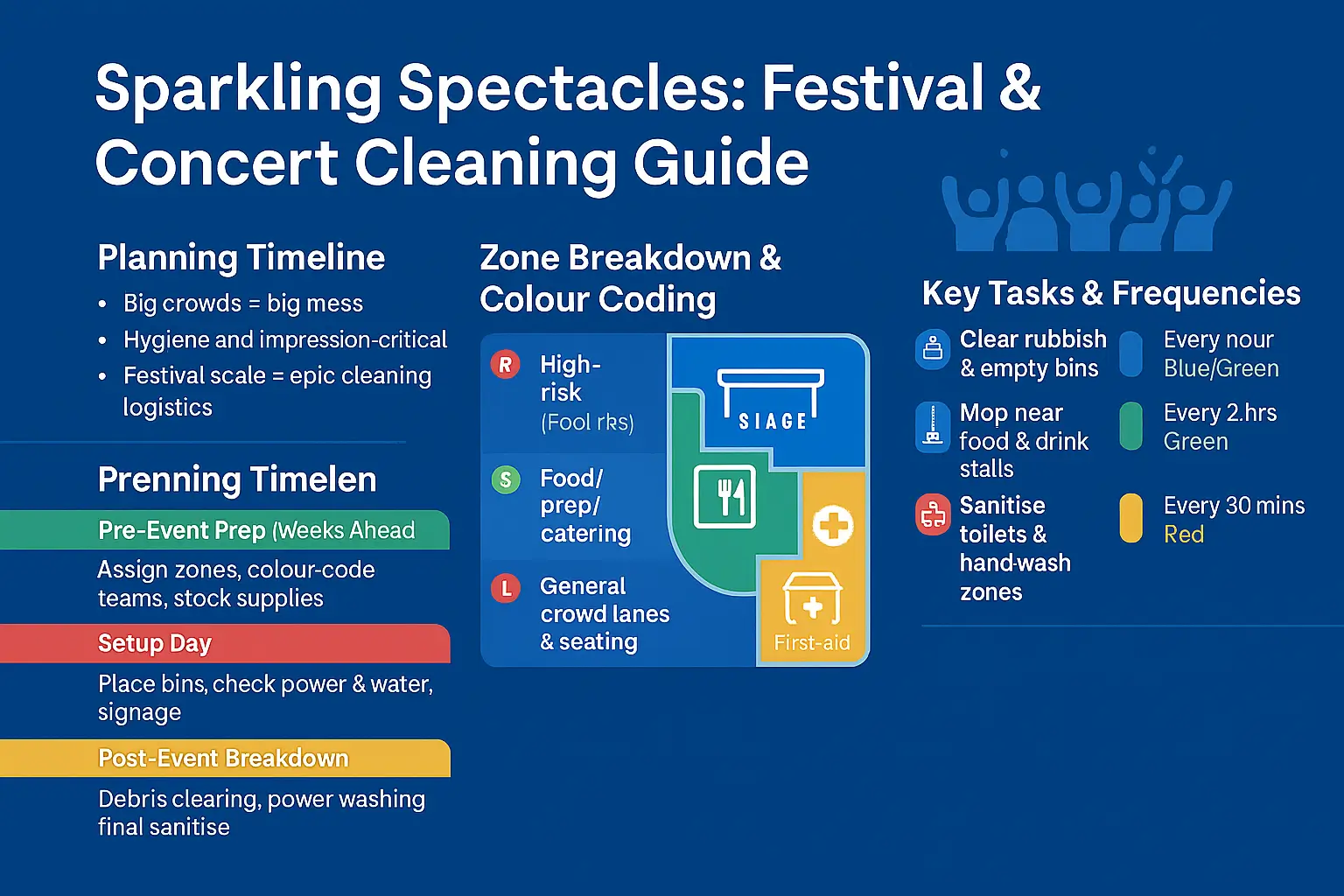
Your Partner in Pristine Events
At LZH Cleaning Group, we understand the monumental task of managing cleanliness at large-scale events. Our expertise in how to plan cleaning for festivals and concerts ensures every detail, from pre-event logistics to post-event restoration, is handled with precision.
This dedication to comprehensive hygiene extends to all areas of cleaning, including the critical role of quality linen management and professional laundry services for associated hospitality settings.
With our experienced, DBS-cleared teams and commitment to sustainable practices, we deliver exceptional results that protect your reputation, enhance attendee satisfaction, and ensure your event shines.
Let’s Make Your Next Event Spotless
Ready to ensure your next festival or concert leaves a lasting impression for all the right reasons? Don’t leave cleanliness to chance.
Contact LZH Cleaning Group today for a bespoke event cleaning solution tailored to your specific needs. Let us handle the hard work, so you can focus on delivering an unforgettable experience.




